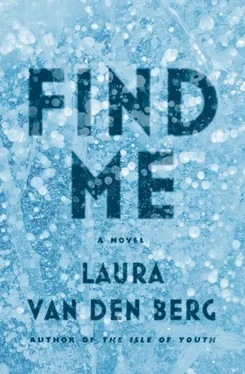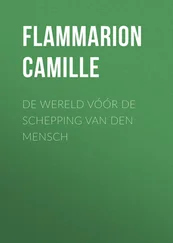I call the basement the zero floor. On the zero floor, there is a door with a triangle of glass in the center, a small window to the outside, and beneath it the faint green glow of a security keypad. Floors seven through nine sit empty. All elevator service has been suspended. You can punch the round buttons, but nothing will happen. Dr. Bek believes in the importance of exercise, so the patients have free passage to the other floors by going through the stairwells, except the first floor, where the staff lives, and the tenth floor, where the sick patients go — both are forbidden to us, also guarded by keypads.
The Dining Hall has a keypad too, but the staff allows those doors to stay open. Whenever possible, they like to create the illusion of freedom.
In the beginning, there were thirty patients on each floor. Now, after three months, no floor has more than fifteen. But the staffing has not changed. There are still ten nurses and Dr. Bek. “Way to lighten your workload!” Louis and I sometimes joke, because laughter makes us feel brave. In the end, the patients might be outnumbered.
An incomplete list of the rules: each Floor Group has a job within the Hospital. The Common Room is located on floor five and it is the job of our Floor Group to keep that space neat and clean. Floor Group three is in charge of the library. Every other week, Group two rounds up patient laundry in canvas rolling carts. After meals, Groups four and six collect trash, stack the red plastic trays, and wipe the warm insides of the microwaves and the stainless steel buffet tables. The surfaces of the tables are dull, but sometimes I catch a smudged reflection as I move through the food line and think, Who is that face? Each floor is responsible for keeping their own hallway in order. “A busy mind is a healthy mind,” Dr. Bek likes to say.
In the Hospital, there are no razors in the showers, just miniature bars of white soap that melt between fingertips, slip down drains. In the Hospital, there is nothing to drink but water. The plastic chairs in the Dining Hall are the color of tangerines. In the Hospital, we celebrate every patient birthday, knowing full well that it might be their last. In the Hospital, our meals come frozen in black trays, the plastic coverings fringed with ice, and we wait in line to heat them in the large humming microwaves. In the Hospital, there is no such thing as mail.
* * *
Before long the other patients lose interest in pilgrim spotting and go back to rummaging through the books in the Hospital library or watching TV in the Common Room or trying to sneak into the Computer Room on the fourth floor, yet another keypadded space, to check WeAreSorryForYourLoss.com, a government-maintained list of people reported dead from the sickness. We have supervised Internet Sessions every Wednesday and Friday, though of course we always want more.
When breakfast ends each morning, I stand on an orange chair and look out the Dining Hall windows. I turn my back on the maze of long tables, the clatter of the Groups stacking trays. The Dining Hall is on the fifth floor; the bars on the windows are thick as arms. I peer between them, searching for pilgrims. Sometimes it’s the same people. Or a new one has arrived. Or there are no pilgrims at all, just a scattering of footprints in the brown soil.
I spend a lot of time thinking about why the pilgrims started coming here, how they even found us. The easy answer is that they think this is a safe place, that we might have a cure, but that reasoning has never satisfied me. I do much of this thinking in the library, sitting between the squat bookcases filled with dictionaries and encyclopedias, plus books on space travel and the Mayan empire and dinosaurs. Dr. Bek believes that even though our bodies are confined to the Hospital, there is no reason to limit our minds.
I think about how devoted the pilgrims seem, the way they stand out there in all kinds of weather, staring up at the windows. They don’t bang on the doors and shout to be let inside; they don’t demand to be included in our secrets. They just wait. Dr. Bek is always reminding us of our specialness. Do the pilgrims know we’re special too?
For a while, the library is the space I like best. All the patient quarters are white-walled rooms with white twin beds and white rolling medicine cabinets — other things in the Hospital that are white: the sheets, the pillows, the hazmat suits of the nurses, the flimsy shower curtains, the towels that scratch our skin — and so the walnut bookcases and the round olive-colored rug make the library feel special, a portal to a place that is separate from the rest of the Hospital.
When I start reading about the dinosaurs and the Mayans, however, the things I learn disturb me. For example, the book on the dinosaurs is not about how big and magnificent they were, but about why they all died. There is no agreement on what happened. An asteroid, continental drift, an epidemic. In the book about the Mayans, the author says they were wiped out by a plague, that every so often “incurables” appear and civilizations are reset. When I discuss my findings with Dr. Bek, he says the sickness is not the result of some cosmic reordering. Rather it’s the simple truth that the smallest alteration can create the perfect atmosphere for a new disease to emerge. “The world is a very fragile place,” he tells me, another favorite line of his.
I’ve grown up knowing the world is fragile. No one needs to tell me that.
* * *
I stretch out in a hallway. I’ve been walking the Hospital for so many hours, I’ve forgotten what floor I’m on. I only know that I can’t keep moving. I lie on my back, my arms pressed against my sides, and feel the cool on my spine. On the patient floors, the hallways are identical: long and white and fluorescent-lit, with an arched, barred window at one end. I think of the different Floor Groups standing at their window and watching the pilgrims at the same time, all of us mirrors of each other.
I gaze up at the lights and feel the burn in my corneas. I wonder how long I would have to look into them before I went blind. I feel the brightness in my cheekbones and inside my mouth. I feel it sinking into my skull. The floor stays empty. I begin to think no one will ever find me here. That I can lie like this forever, still and filled with light.
The voice brings me out. None of the patients have ever seen the Pathologist, but every day his voice crackles over the wall speakers. I sit up and rub my eyes, imagining a man alone in a room on the tenth floor, whispering into a machine. Sometimes he has practical things to say, like an announcement about meals, and sometimes he just talks to us.
Today he tells us what good patients we are. Meditations, these are called, even though I’ve always been under the impression that meditating is something you’re supposed to do in silence. REPEAT AFTER ME: YOU ARE WELL, YOU HAVE ALWAYS BEEN WELL, YOU WILL ALWAYS BE WELL. He says we’re doing everything right. All we need to do now is keep breathing.
Three things brought me to the Hospital. In my first month, in the library, I wrote it all out on sheets of paper and pretended I was telling someone a story.
Number one: the sickness itself. The first case was reported in June, in Bakersfield, California, when a fifty-year-old woman named Clara Sue Borden stumbled into the ER with a constellation of silver blisters on her face. She couldn’t walk a straight line. She pressed a hand over her right eye, claiming everything she saw out of that eye had a funny look. She couldn’t tell anyone her name or date of birth or where she lived or how she got to the ER. If there were relatives to call. She remembered nothing. “I am me,” she kept saying.
For as long as I could remember, the weather had felt apocalyptic. Y2K fever and the War on Drugs and the War on Terror. The death of bees and the death of bats and radioactivity in the oceans and ravenous hurricanes. I thought the country was like a fire that would rage and rage until the embers lost their heat, but instead the sickness appeared and within two weeks it had burned through the borders of every state in America. It was everywhere and it was so fast. At first, the Centers for Disease Control thought it was a highly contagious strain of Creutzfeldt-Jakob. Autopsies showed prions eating through brain tissue, leading to sudden neurological collapse, but once they got everything under the microscopes, they realized it was something different, something new. We were awash in theories — biological attack, apocalypse, environmental meltdown — and no solutions. Our brains, our greatest human asset, were disintegrating. The president was moved to a secret location and the World Health Organization announced a Phase 5 alert. Our borders with Mexico and Canada were closed. For once, no one wanted to come in. And they definitely didn’t want us coming out. By August, one hundred thousand people had died. By September, that number had doubled. Experts now say the toll could be worse than the 1918 influenza, which left half a million Americans dead.
Читать дальше












